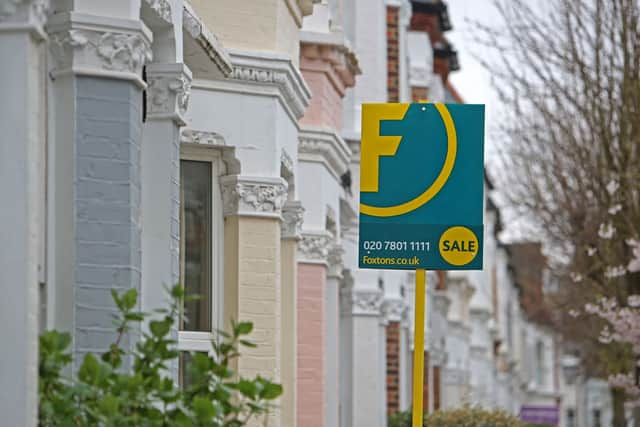Mortgage rate increase: What to do if you can’t pay as average two-year fix hits 6% - why are rates going up?
and live on Freeview channel 276
Pressure is mounting on millions of UK homeowners after the cost of a two-year fixed-rate mortgage rose above six per cent on Monday, June 19. Mortgage costs have been increasing sharply over the past week, with a further spike in interest rates expected to be announced by the Bank of England on Thursday (June 22).
The average cost of a two-year fixed-rate deal rose from 5.98 per cent on Friday to 6.01 per cent on Monday, according to data provider Moneyfacts. Meanwhile, the cost of a five-year deal has risen from 5.62 per cent to 5.67 per cent.
Advertisement
Hide AdAdvertisement
Hide AdTwo-year gilt yields rose 0.19 percentage points on Monday as they reached 5.04 per cent, their highest level since 2008 and a sign that mortgage rates “could have even further to rise”, according to the Financial Times. The number of residential mortgage deals available is also dropping - there were 4,683 products available on Monday (June 19), down from 4,923 on Friday (June 16).
Prime Minister Rishi Sunak has ruled out an offer of any new support to people struggling with mortgage payments. He said the government should “stick to the plan” to halve inflation in its attempts to tackle the cost of living crisis.
Speaking on ITV’s Good Morning Britain, Mr Sunak said: “I know the anxiety people will have about the mortgage rates, that is why the first priority I set out at the beginning of the year was to halve inflation because that is the best and most important way that we can keep costs and interest rates down for people.
“We’ve got a clear plan to do that, it is delivering, we need to stick to the plan. But there is also support available for people. We have the mortgage guarantee scheme for first-time buyers and we have the support for mortgage interest scheme which is there to help people as well.”
Advertisement
Hide AdAdvertisement
Hide AdBut UK inflation remains stubbornly high at 8.7 per cent - well above the Bank of England’s two per cent target.


Why are rates rising and how is my mortgage affected?
Morgage rates have been rising since recent figures showed that UK inflation, which is the measure of rising prices, is not coming down as quickly as hoped. The Bank of England has raised interest rates multiple times since December 2021 to try and cool inflation.
By putting up interest rates, borrowing becomes more expensive. It is then hoped in return that people will spend less, which in turn should lower inflation. But unfortunately, higher rates have a direct impact on millions of variable mortgage deals.
If you have a tracker mortgage, then your rate will go up when the Bank of England base rate rises. Those with standard variable rate (SVR) deals typically see their costs rise as well, although it is down to your lender to decide whether to up its rates.
Advertisement
Hide AdAdvertisement
Hide AdYou’re protected from rate rises until your current deal ends if you’re on a fixed rate mortgage - and it is estimated more than 800,000 homeowners still have to remortgage onto a much higher rate in 2023.
What help is available if I can’t pay my mortgage?
Speak to your mortgage lender
Your first step should always be to talk to your lender as soon as possible if you’re having trouble paying your mortgage, ideally before you miss a payment, and they can discuss your options with you.
It might be that they allow you to take a payment holiday if you’re really struggling. Your lender might also discuss the possibility of temporarily switching you to interest-only payments or lengthening your mortgage which could lower your monthly repayments.
Keep in mind though that this will mean it will take you longer to pay off your mortgage, so you’ll end up paying more overall. Legally, your bank cannot start the process of repossessing your home as long as you are actively engaged with finding a solution to your problems and major lenders won’t start repossession proceedings until at least three months of arrears have occurred.
Get free debt advice
Advertisement
Hide AdAdvertisement
Hide AdIf you ignore any mortgage troubles you’re having, you could risk losing your home. If you’re struggling, get free debt advice as soon as possible. You can speak to one of the following organisations for free debt advice:
- Citizens Advice (0800 240 4420)
- StepChange (0800 138 1111)
- National Debtline (0808 808 4000)
Apply for an SMI loan to help with interest payments
You might be able to apply for a Support for Mortgage Interest (SMI) loan from the government if you’re struggling with mortgage interest payments. As it is a loan, it does need to be paid back - plus interest.
The current interest is 1.4 per cent but the rate might increase or decrease. You usually pay back the SMI loan once you’ve sold your home, but there are some circumstances where you have to pay it back earlier such as if you go bankrupt.
You might be able to get a SMI loan if you claim:
- Income-related Employment and Support Allowance
- Income based Jobseeker’s Allowance
- Income Support
- Universal Credit
- Pension Credit
If you live in Wales, you may able to apply for a Mortgage Rescue Scheme, and if you live in Scotland you might be able to help through the Home Owners’ Fund.
Comment Guidelines
National World encourages reader discussion on our stories. User feedback, insights and back-and-forth exchanges add a rich layer of context to reporting. Please review our Community Guidelines before commenting.
